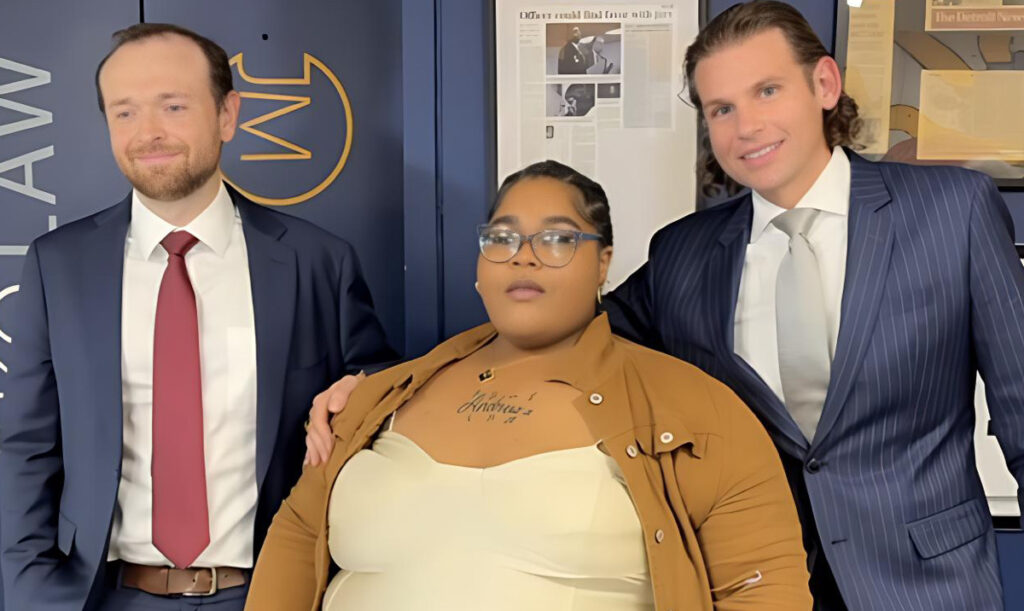
Whew! Detroit rapper Dajua Blanding, known by her stage name Dank Demoss, is heading to court after being denied a ride by a lyft driver due to her size.
The Incident: Lyft Driver Denies Ride
What Happened?
Earlier this month, Blanding requested a Lyft ride to a Detroit Lions watch party, excited for the event. However, when the driver arrived, he quickly assessed her and informed her that he could not provide a ride due to her weight. This shocking encounter was recorded by Blanding, who was eager to reach her destination.
The driver first claimed that she wouldn’t fit in his sedan, to which Blanding confidently responded, “I can fit in this car.” He dismissed her, insisting, “Believe me, you can’t.” His reasons escalated from concerns about space to claiming his tires couldn’t handle her weight. Ultimately, he suggested she order an Uber XL instead and offered to refund her ride to avoid any charges.
RELATED:Couple Sues JetBlue After Ice Block Crashes Through Bedroom Ceiling
RELATED:Ryanair Sues Passenger for $15,000 Over Disruptive Behavior
Blanding’s Response
Feeling hurt and discriminated against, Blanding expressed her disbelief, stating, “I’ve been in cars smaller than that.” Her frustration highlights a significant issue: the treatment of plus-sized individuals in public spaces and services. Blanding has since retained attorneys Jonathan Marko and Zach Runyan to pursue legal action against Lyft, aiming to address the discrimination she faced.
Lyft’s Statement on Discrimination
Company Policy
In response to the incident, Lyft released a statement emphasizing its commitment to equality and respect. The company stated, “Lyft unequivocally condemns all forms of discrimination. We believe in a community where everyone is treated with equal respect and mutual kindness.” This stance aligns with their community guidelines, which explicitly prohibit harassment or discrimination.
Implications for Rideshare Services
This case raises important questions about the policies of rideshare companies and the treatment of their passengers. Discrimination based on size is a sensitive topic, and companies like Lyft must ensure that their drivers are trained to treat all passengers respectfully, regardless of their appearance or size. This incident serves as a wake-up call for the industry, prompting a reevaluation of how rideshare services address such sensitive issues.
Legal Implications of the Case
Discrimination Lawsuits in Rideshare Services
Blanding’s lawsuit could set a precedent for how rideshare companies handle cases of discrimination based on size. Many individuals may not be aware of their rights when it comes to transportation services. If successful, this case could encourage other passengers to speak out against discrimination they face in rideshare situations.
Potential Outcomes
Should Blanding’s case proceed, it could lead to changes in Lyft’s policies and training for drivers. This case might also inspire similar lawsuits against other rideshare companies, leading to broader industry changes aimed at preventing discrimination and ensuring equitable treatment for all passengers.
—
FAQs
1. What are the main allegations in Blanding’s lawsuit against Lyft?
Blanding alleges that the Lyft driver denied her a ride due to her size, constituting discrimination.
2. How does Lyft address issues of discrimination?
Lyft states that it condemns all forms of discrimination and has guidelines to ensure respectful treatment of all passengers.
3. What legal rights do passengers have regarding discrimination in rideshare services?
Passengers have the right to seek legal action if they face discrimination based on size, race, or any other characteristic in rideshare services.
4. How can this case impact the rideshare industry?
This case could lead to increased awareness and changes in company policies regarding discrimination, potentially setting a precedent for similar cases.
5. What should passengers do if they experience discrimination in rideshare services?
Passengers should document the incident, report it to the rideshare company, and consider seeking legal advice if necessary.
6. What steps can rideshare companies take to prevent discrimination?
Rideshare companies can implement comprehensive training for drivers, establish clear reporting procedures, and enforce strict penalties for discriminatory behavior.